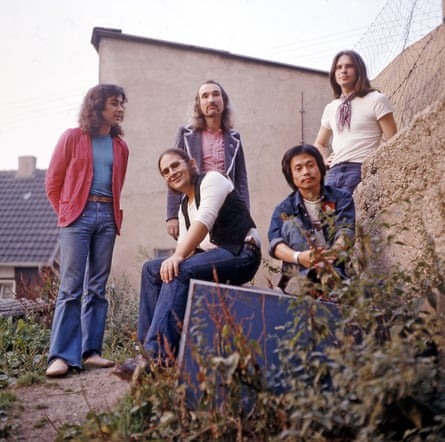The German band Can, whose former singer Damo Suzuki has died at the age of 74, were innovators in many ways, but particularly because the group harboured two of the most original rock vocalists who ever lived. While their 1969 debut album, Monster Movie, featured the machine-gun poetic stylings of American expat Malcolm Mooney, it was Japanese free spirit Kenji “Damo” Suzuki, who appeared on three stunning studio albums between 1971 and 1973, who most completely embodied their adventurous ethos.
In a 1971 TV clip from the popular German show Beat Club, we see guitarist Michael Karoli, drummer Jaki Liebezeit, bassist Holger Czukay, and keyboardist Irmin Schmidt in vibrant psychedelic colors as they come together to play the abstract groove of “Paperhouse.” After a minute of improvisation, the camera shifts to Suzuki, a thin man with long hair and no shirt. He sings in free verse without a set rhyme scheme and often uses similar sounding words, but the emotion of longing is clear. Towards the end, one line can be heard clearly: “You have the power to create anything you want with your mind.” This theme of endless possibilities in Suzuki’s lyrics perfectly captures the experimental energy of Can, a band that was influenced by the West German art scene. His fluid use of language was at the core of their unique and unconventional rock music in the 1970s.
He and his band preferred to make up their performances as they went along. He arrived in Europe in 1968 and spent a few years traveling between a Swedish commune, rural Ireland, and various stops in France, Germany, and the UK. During this time, he busked, painted, and played guitar. Rob Young documented this period in his Can biography, All Gates Open. While performing in a stage production of Hair in Munich, he fortuitously met Czukay and Liebezeit. Suzuki was doing an improvised performance on the street when Can approached him to be the singer for a four-night residency at the Blow Up club in the city. Suzuki inquired about rehearsing, but upon learning there would not be one, he agreed to the deal.

In Suzuki, Can discovered a vocalist who possessed the same level of adaptability and unpredictability as the band. His unconventional lyrics allowed him to seamlessly transition in and out of lengthy songs, during a period when the group was exploring new musical territories and heavily involved in creating film soundtracks. Suzuki was the enigmatic figure who infused cryptic wisdom into the wild and bombastic jams of Can, such as the 14-minute track “Mother Sky” (“I believe madness is as pure as mother sky”) and “Halleluwah” (“I’m on a search for my brother”). However, his mischievous and sometimes childlike lyrics, similar to those of Syd Barrett, could also fit effortlessly into more anthemic pop tunes like “Moonshake” and Can’s 1971 German hit single “Spoon” (“I’m sitting on my chair where nobody cares”).
Can and Suzuki collaborated on three studio albums: Tago Mago (1971), Ege Bamyasi (1972), and Future Days (1973). These albums showcase a clear evolution from mystical rock to complex funk-fusion, culminating in a multi-layered, ambient sound. Considered a pioneer in the genre, these records gained popularity not only in West Germany’s rock scene of the 1970s but also among independent music communities worldwide. They were particularly influential in the post-rock scenes of the US and UK in the 1990s, as well as the European electronica movement of the same era and the post-punk band The Fall from Britain.
Suzuki departed from Can just as abruptly as he had joined them, leaving a recording session in 1973. This coincided with his growing interest in esoteric Christianity, which took priority over his music career. In the years that followed, he downplayed his time with the band and focused on new creative ventures rather than romanticizing his past. He demonstrated his approach through the formation of Damo Suzuki’s Network, a worldwide community of musicians who would join him for impromptu jam sessions whenever he visited their cities.
“Skip the promotion for the newsletter.”
after newsletter promotion
-
Derek Walmsley, a writer on music living in London, was previously the editor of the Wire.
Source: theguardian.com


